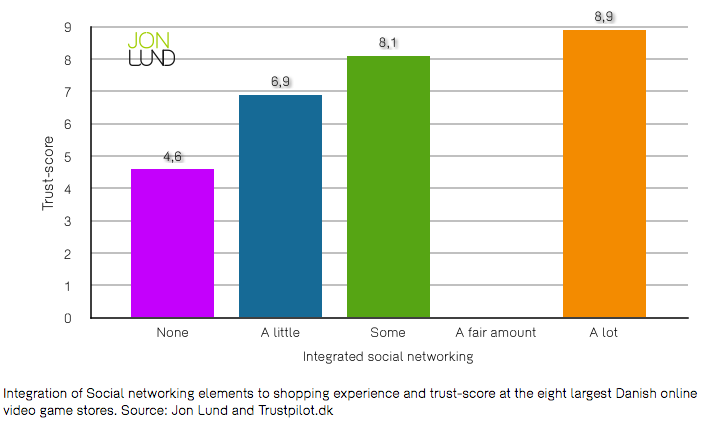Use of social networking elements on either your own site or on Facebook clearly correlates with customer satisfaction. This is one of the remarkable facts I’ve dug up in my latest report: “E-commerce, trust and social networking – the case of Danish online video game stores” investigating Amazon, Coolshop and Fona among others.
What I’ve done
What I’ve done is first to identify the eight largest online stores selling video games or accessories in Denmark. Then I’ve evaluated their use of social media, either at their own site or at Facebook, and categorized them in groups ranging from “none” to “a lot” integrated social networking. Trust-scores I’ve gathered from Trustpilot.com. And the results are strikingly clear: the more social networking elements employed, the higher the trust-score.
Frequently returning to the store
The findings is even more remarkable since I’m also able to show a clear positive connection between trust-scores and the usage of the online stores: the higher the trust-scores, the more frequently users returns to the store.
Happy customers returns more often online
Thinking about it, It’s hardly surprising that happy customers return more often than unhappy ones. However this probably is more so in an online shopping environment where issues like “what stores are within walking distance?” won’t be able to distract you from following your gut feelings: shop at the stores you like the best.
Spread the good news; dampen the bad
As for the connection between Facebookish behaviour and trust-scores the logic runs as follows: mechanisms whereby customers can express themselves to other customers helps to spread the good news, when customers are actually happy and serves to show the store in question to be responsive, listening to customers complaints, when complaints arises.
The three Facebook-effects
This leads to the following:
- Existing customers are hence reinforced in their positive impressions, to the extend they are positive in the first place. This leads to higher trust-scores.
- If existing customers have negative experiences with the store in question, they might feel relief simply by being allowed to raise their criticism at an officially endorsed site. At best, they’ll eventually forgive mistakes made by the store. This might lead to less negative evaluation and higher trust-scores.
- Users who are not yet customers will be directly influenced by positive endorsements (“this sounds like a good place for me to shop”), while criticism (to the extend, off course, the store’s able to provide adequate explanations for it’s behaviour) creates a feeling of responsiveness and willingness to deal with mistakes when they occur. Both off which will lead to higher trust-scores, when the customers eventually makes his first purchase.
The eight sites dealt with in the report are amazon.com/amazon.co.uk, cdon.dk, coolshop.dk, komplett.dk, elgiganten.dk, fona.dk, gucca.dk and wupti.com.
Download full report
Send, download and print. Price: 345 ddk/€45,50 (ex. VAT)
“E-commerce, trust and social networking – the case of Danish online video game stores” 15 pages, 6 illustrations, 2 tables.
To order the report, send an email to jon@jon-lund.com including your contact information with subject: “Buy Jon Lunds Facebook boosts trust”, and you’ll receive both the report as pdf-file and an invoice.

Pingback: Tweets that mention Jon Lund » Blog Archive » Facebook boosts trust for online video game stores -- Topsy.com
Pingback: Jon Lund » Blog Archive » 5-trins guide: Sådan får fysiske butikker netsucces
Der er lukket for kommentarer.